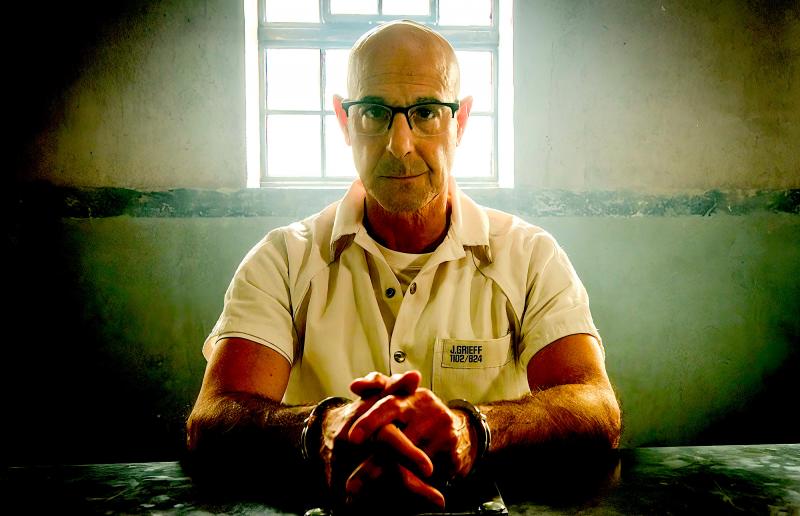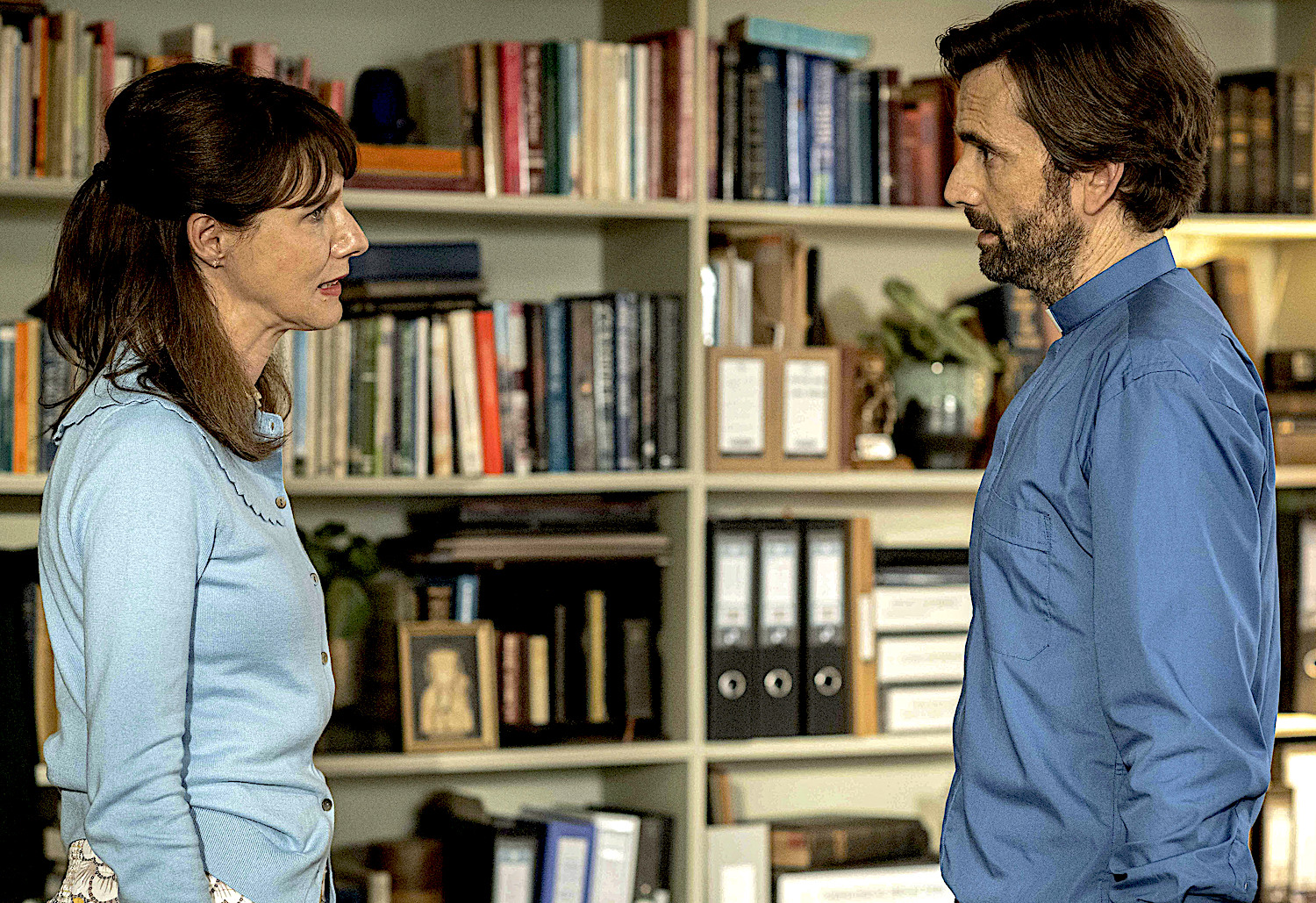Inside Man, BBC One review - strong cast trapped on a sinking ship | reviews, news & interviews
Inside Man, BBC One review - strong cast trapped on a sinking ship
Inside Man, BBC One review - strong cast trapped on a sinking ship
Steven Moffat's continent-jumping mystery can't get its act together

Screenwriter and showrunner Steven Moffat is renowned for some of his work, especially Sherlock, but other stuff not so much (I direct you towards Dracula or The Time Traveler’s Wife). When the history is written, Inside Man is liable to languish at the dog’s-breakfast end of the Moffat canon.
There used to be a TV cooking show where contestants had to somehow create a meal from a random batch of ingredients they found in the fridge – a pineapple, a pork chop, a crumpet and a jar of mayonnaise, perhaps. Inside Man (BBC One) looked as if it was similarly devised as a kind of brain-teaser. How can you create a drama out of a tormented Home Counties vicar, his teenage son, his maths tutor and a paedophile verger, plus two convicted murderers thousands of miles away on Death Row in an American prison? Well maybe you can’t, since while Inside Man boasted a powerful cast, the twain never met. As the series ran through its four episodes, a convincing denouement grew further and further out of reach as the story gradually sank up to its neck in a quicksand of preposterous melodrama. The supposedly gripping climax took on a life of its own and decided to express itself as farce.
Still, credit where it’s due. Stanley Tucci put in a silkily seductive turn as Jefferson Grieff – despite his clunkily-signposting surname – who had reached a philosophical acceptance that his death sentence was condign punishment for murdering his wife. As a former professor of criminology, he made amends of a sort by analysing cases brought to him by desperate citizens, though the “Death Row detective” notion was a bit too Hannibal Lecter for comfort. There was light relief from his mass-murdering, though very courteous, sidekick Dillon (Atkins Estimond). Back in the bucolic English countryside, David Tennant made a decent fist of portraying Harry Watling (sporting the daring catchphrase “I’m a fucking vicar”), but he was tripped up by a storyline about the pervy verger’s memory stick crammed with vile child-abuse pornography. A credibility-stretching cluster of non-sequiturs and misunderstandings ended up with Watling ‘fessing up in a martyred kind of way to being the owner of said memory stick. Inexplicably, this prompted him to throw the delightful and feisty Janice Fife (Dolly Wells, pictured above with Tennant) down a flight of steps and lock her in his basement, where she remained for the rest of the series.
Back in the bucolic English countryside, David Tennant made a decent fist of portraying Harry Watling (sporting the daring catchphrase “I’m a fucking vicar”), but he was tripped up by a storyline about the pervy verger’s memory stick crammed with vile child-abuse pornography. A credibility-stretching cluster of non-sequiturs and misunderstandings ended up with Watling ‘fessing up in a martyred kind of way to being the owner of said memory stick. Inexplicably, this prompted him to throw the delightful and feisty Janice Fife (Dolly Wells, pictured above with Tennant) down a flight of steps and lock her in his basement, where she remained for the rest of the series.
Perhaps in an attempt at mirror-image thematic continuity, determined journalist Beth Davenport (Lydia West) also fell down a flight of stairs in episode four, but it was in vain. If there was a point, it had long since left the building, a fact vividly illustrated by absurd scenes of Watling and his son having tortuous phone conversations while not realising they were on different floors of the vicar’s home. The gratuitous deus ex machina demise of Watling’s wife Mary (a thankless role for Lyndsey Marshal) put the bathetic icing on a very indigestible cake.
For the cherry on top, Mr Grieff had a smug little homily: “There are moments that make murderers of us all… we’re anyone on a bad day.” Yeah, and I’m a fucking vicar.
Add comment
The future of Arts Journalism
You can stop theartsdesk.com closing!
We urgently need financing to survive. Our fundraising drive has thus far raised £49,000 but we need to reach £100,000 or we will be forced to close. Please contribute here: https://gofund.me/c3f6033d
And if you can forward this information to anyone who might assist, we’d be grateful.

Subscribe to theartsdesk.com
Thank you for continuing to read our work on theartsdesk.com. For unlimited access to every article in its entirety, including our archive of more than 15,000 pieces, we're asking for £5 per month or £40 per year. We feel it's a very good deal, and hope you do too.
To take a subscription now simply click here.
And if you're looking for that extra gift for a friend or family member, why not treat them to a theartsdesk.com gift subscription?
more TV
 Alien: Earth, Disney+ review - was this interstellar journey really necessary?
Noah Hawley's lavish sci-fi series brings Ridley Scott's monster back home
Alien: Earth, Disney+ review - was this interstellar journey really necessary?
Noah Hawley's lavish sci-fi series brings Ridley Scott's monster back home
 The Count of Monte Cristo, U&Drama review - silly telly for the silly season
Umpteenth incarnation of the Alexandre Dumas novel is no better than it should be
The Count of Monte Cristo, U&Drama review - silly telly for the silly season
Umpteenth incarnation of the Alexandre Dumas novel is no better than it should be
 The Narrow Road to the Deep North, BBC One review - love, death and hell on the Burma railway
Richard Flanagan's prize-winning novel becomes a gruelling TV series
The Narrow Road to the Deep North, BBC One review - love, death and hell on the Burma railway
Richard Flanagan's prize-winning novel becomes a gruelling TV series
 The Waterfront, Netflix review - fish, drugs and rock'n'roll
Kevin Williamson's Carolinas crime saga makes addictive viewing
The Waterfront, Netflix review - fish, drugs and rock'n'roll
Kevin Williamson's Carolinas crime saga makes addictive viewing
 theartsdesk Q&A: writer and actor Mark Gatiss on 'Bookish'
The multi-talented performer ponders storytelling, crime and retiring to run a bookshop
theartsdesk Q&A: writer and actor Mark Gatiss on 'Bookish'
The multi-talented performer ponders storytelling, crime and retiring to run a bookshop
 Ballard, Prime Video review - there's something rotten in the LAPD
Persuasive dramatisation of Michael Connelly's female detective
Ballard, Prime Video review - there's something rotten in the LAPD
Persuasive dramatisation of Michael Connelly's female detective
 Bookish, U&Alibi review - sleuthing and skulduggery in a bomb-battered London
Mark Gatiss's crime drama mixes period atmosphere with crafty clues
Bookish, U&Alibi review - sleuthing and skulduggery in a bomb-battered London
Mark Gatiss's crime drama mixes period atmosphere with crafty clues
 Too Much, Netflix - a romcom that's oversexed, and over here
Lena Dunham's new series presents an England it's often hard to recognise
Too Much, Netflix - a romcom that's oversexed, and over here
Lena Dunham's new series presents an England it's often hard to recognise
 Insomnia, Channel 5 review - a chronicle of deaths foretold
Sarah Pinborough's psychological thriller is cluttered but compelling
Insomnia, Channel 5 review - a chronicle of deaths foretold
Sarah Pinborough's psychological thriller is cluttered but compelling
 Live Aid at 40: When Rock'n'Roll Took on the World, BBC Two review - how Bob Geldof led pop's battle against Ethiopian famine
When wackily-dressed pop stars banded together to give a little help to the helpless
Live Aid at 40: When Rock'n'Roll Took on the World, BBC Two review - how Bob Geldof led pop's battle against Ethiopian famine
When wackily-dressed pop stars banded together to give a little help to the helpless
 Hill, Sky Documentaries review - how Damon Hill battled his demons
Alex Holmes's film is both documentary and psychological portrait
Hill, Sky Documentaries review - how Damon Hill battled his demons
Alex Holmes's film is both documentary and psychological portrait
 Outrageous, U&Drama review - skilfully-executed depiction of the notorious Mitford sisters
A crack cast, clever script and smart direction serve this story well
Outrageous, U&Drama review - skilfully-executed depiction of the notorious Mitford sisters
A crack cast, clever script and smart direction serve this story well

Comments
Dreadful ending
The acting was good , but the
the perfect vicar who would
of course it's preposterous
Switched off after he
I've seen some rubbish in my
I know we could all watch
As soon as we decided it was
I love Moffat's dark comedy
Utter pish. Turned off after
Well, I like it, said
The whole plot rested upon